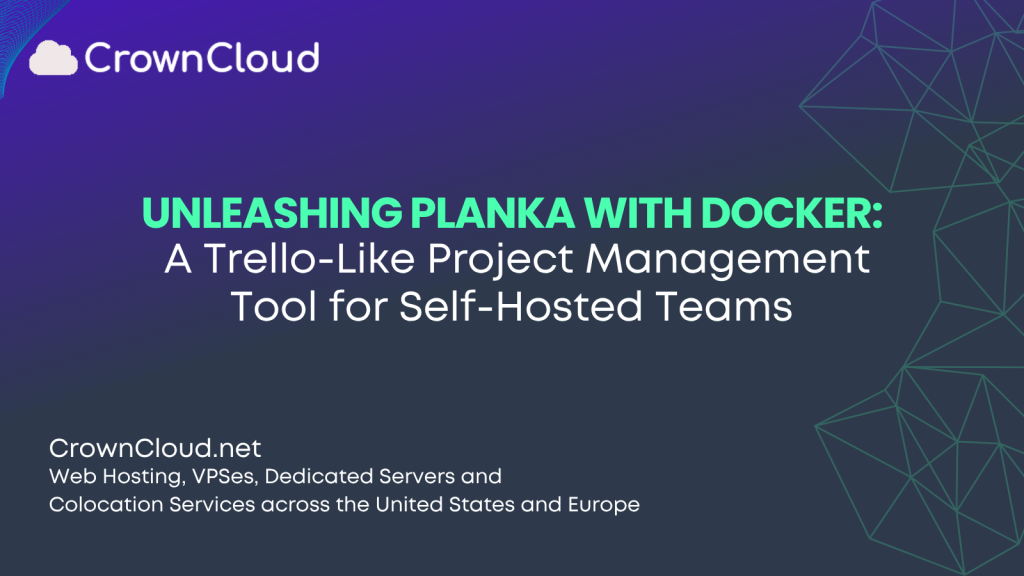Today’s Article Delves into Planka, a Powerful Trello-Like Project Management Tool for Self-Hosted Teams with Docker
What is Planka?
Planka is a lightweight, open-source project management solution designed for simplicity and efficiency. Inspired by tools like Trello, it offers a streamlined Kanban board interface to help teams and developers effortlessly organize tasks, projects, and workflows.
Tailored for small teams and tech-savvy users, Planka combines clarity with power, making it easy to track work and collaborate in real time. Thanks to Docker, you can deploy Planka in minutes, with zero hassle or manual dependency handling.
What is Docker?
Docker is a tool that allows you to package applications and their dependencies into containers—lightweight, standalone environments that run reliably on any Linux server. Instead of manually installing software components, Docker lets you launch pre-configured apps using a single command.
For Planka, Docker simplifies the entire setup process by bundling everything (Planka, Node.js, PostgreSQL, Redis) into containers—no manual setup required.

Core Features of Planka:
- Visual Kanban Boards – Manage tasks through drag-and-drop cards, customizable lists, and columns.
- Team Collaboration – Add members, assign responsibilities, and keep everyone on the same page.
- Live Synchronization – Changes appear instantly across all users without needing to refresh.
- Task Details – Add labels, set due dates, and communicate via comments—all within a card.
- Built-In User Management – Comes with registration, login, and email verification out of the box.
- RESTful API – Seamlessly connect Planka to your tools and automate repetitive processes.
- Responsive Design – Optimized for both desktop and mobile for on-the-go productivity.
Why Run Planka with Docker?
- Rapid Setup – Get up and running with just a few Docker commands.
- No Manual Installs – Avoid configuring Node.js, Redis, or PostgreSQL manually.
- Clean Isolation – Containers keep your system uncluttered and organized.
- Deploy Anywhere – Works flawlessly on any Linux machine, server, or cloud VPS.
- Effortless Maintenance – Updating is as simple as pulling the latest image.
Advantages of Using Planka in Docker:
- Self-Hosted Privacy – Maintain full control over your data with local hosting.
- Minimal Resource Usage – Runs efficiently even on modest hardware thanks to Docker.
- Elegant UI – Clean, modern interface that keeps focus on productivity.
- Team-Oriented Design – Perfect for dev teams, startups, and agile project setups.
- Completely Free – 100% open-source with no licensing restrictions.
- Developer-Friendly – Easy to customize, extend, or integrate into your development pipeline.
System Requirements:
- Operating System: Linux (Debian, Ubuntu, CentOS, Fedora, etc.)
- Docker: Installed and running (
dockeranddocker-compose) - RAM: 512MB minimum (1GB+ recommended)
- Disk Space: 300MB for images + your project data
- Network: Open port (default:
1337) for web access
Installation on Linux (AlmaLinux, CentOS and RockyLinux):
You can find detailed installation instructions in the CrownCloud Wiki:
Purchase a KVM VPS – Choose a KVM VPS plan from us that suits your requirements.
KVM SSD Plans – https://crowncloud.net/ssd_kvm.php
NVMe SSD KVM VPS Plans – https://crowncloud.net/nvme_kvm.php
AMD Ryzen 9 SSD KVM VPS – https://crowncloud.net/ssd_amd_ryzen_kvm.php
Intel Core i9 SSD KVM VPS Plans – https://crowncloud.net/ssd_intel_i9_kvm.php